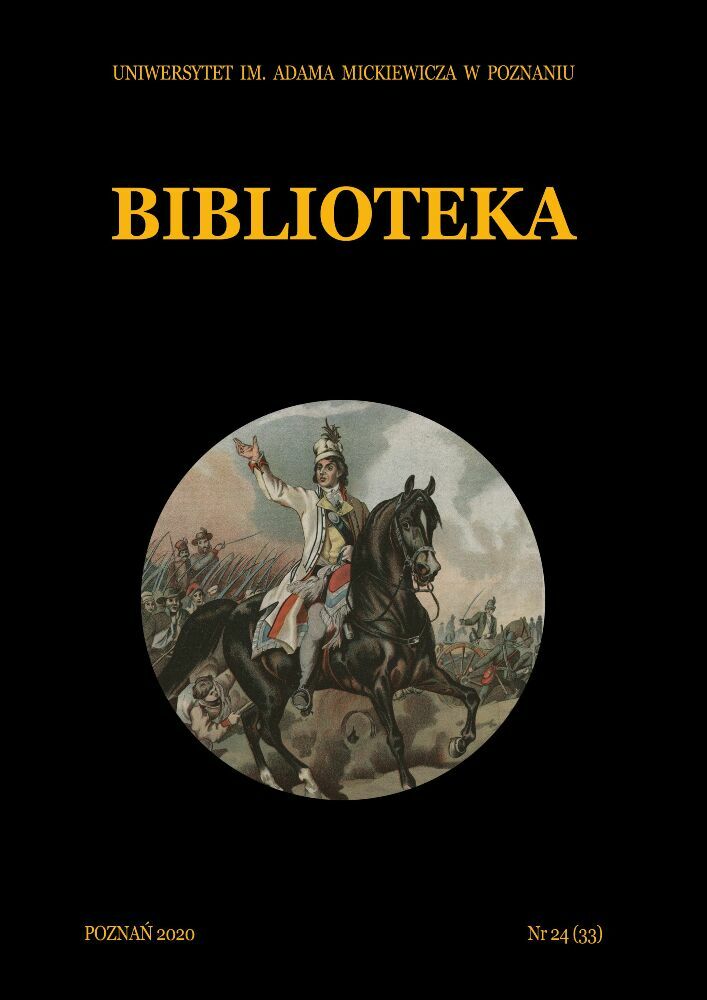Abstract
It is well known that Swedish armies took a number of literary spoils of war from Poland in the 17th century, among others, the library of the Jesuit College in Braniewo in 1626. This article discusses how the collections from Braniewo were received and arranged in the first library building of Uppsala University, to which they had been donated by the Swedish King Gustavus II Adolphus. Books with contents related to theology are discussed in particular. As is shown in the article, books from Braniewo by Catholic authors or editors that were of a more neutral nature, such as books on Church history, Bibles and Bible concordances, were generally considered more useful at this Lutheran university than books by Catholic authors containing, for instance, Bible commentaries, sermons and dogmatics.
References
Annerstedt C., Upsala universitetsbiblioteks historia intill år 1702, Stockholm 1894.
Documenting the Early Modern Book World. Inventories and Catalogues in Manuscript and Print, ed. M. Walsby, N. Constantinidou, Leiden 2013.
Eenberg J., Kort berättelse af de märkwärdigste saker som för de främmande äre at besee och förnimma uti Upsala stad..., Uppsala 1703–1704.
Helander H., Neo-Latin Literature in Sweden in the Period 1620–1720: Stylistics, Vocabulary and Characteristic Ideas, Uppsala 2004.
Malmström Å. Ur den juridiska fakultetens historia, in: Uppsala University 500 years: 11, Uppsala 1976.
Sellberg E., Kyrkan och den tidigmoderna staten. En konflikt om Aristoteles, utbildning och makt, Stockholm 2010.
Sjökvist P., Books from Poznań at the Uppsala University Library, “Z Badań nad Książką i Księgozbiorami Historycznymi” 2017, vol. Polonika w zbiorach obcych, ed. J. Puchalski, A. Chamera-Nowak, D. Pietrzkiewicz, pp. 319–327.
Sjökvist P., Polish Collections at Uppsala University Library: A History of Research, in: Książka dawna i jej właściciele, vol. 2, ed. D. Sidorowicz-Mulak, A. Franczyk--Cegła, Wrocław 2017, pp. 237–244.
Sjökvist P., On the Order of the Books in the First Uppsala University Library Building, “Journal of Jesuit Studies” 2019, vol. 6, pp. 315–326.
Sjökvist P., Litterära krigsbytens öden i Sverige (‘The Destiny of Literary Spoils of War in Sweden’), “Biblis” 89, 2020, pp. 20–26.
Sjökvist P., Literary Spoils of War in Uppsala in Practice [forthcoming].
Trypućko J., The Catalogue of the Book Collection of the Jesuit College in Braniewo Held in the University Library in Uppsala = Katalog księgozbioru KolegiumJezuitów w Braniewie zachowanego w Bibliotece Uniwersyteckiej w Uppsali, 3 vols., ed. M. Spandowski, S. Szyller, Uppsala–Warsaw 2007.
Upsala universitets historia. Bihang I. Handlingar 1477–1654, ed. C. Annerstedt, Uppsala 1877.
Walde O., Storhetstidens litterära krigsbyten, Uppsala 1916–1920.
Unprinted sources
Braniewo Jesuit College Library catalogue, Uppsala University Library, U 274.
Johannes Bureus, register of Braniewo and Frombork books, U 272.
Johannes Bureus, register of Braniewo and Frombork books, U 273.
Jonas Columbus, manuscript at Linköping Diocese Library, W 28. Apograph at Uppsala University Library, R 383.
Uppsala University Library catalogue, the Bibliotheca inferior, Uppsala University Library, Bibl. arkiv K2.
Uppsala University Library catalogue, the Bibliotheca superior, Uppsala University Library, Bibl. arkiv K3.
License
Copyright (c) 2020 Peter Sjökvist

This work is licensed under a Creative Commons Attribution-ShareAlike 4.0 International License.
Utwory opublikowane w czasopiśmie Biblioteka, na platformie Pressto należącej do Uniwersytetu im. Adama Mickiewicza w Poznaniu od 2015 roku są udostępniane na
licencji Creative Commons Uznanie autorstwa-Na tych samych warunkach 4.0 Międzynarodowe.
Tym samym wszyscy zainteresowani są uprawnieni do korzystania z utworów opublikowanych po 2015 roku pod następującymi warunkami:
- uznania autorstwa czyli obowiązek podania wraz z rozpowszechnianym utworem informacji o autorstwie, tytule, źródle (odnośniki do oryginalnego utworu, doi) oraz samej licencji
- na tych samych warunkach — remiksując utwór, przetwarzając go lub tworząc na jego podstawie, należy swoje dzieło rozpowszechniać na tej samej licencji, co oryginał.
Uniwersytet im. Adama Mickiewicza w Poznaniu zachowuje prawo do czasopisma jako całości (układ, forma graficzna, tytuł, projekt okładki, logo itp.).
Autor zachowuje prawa majątkowe, ale udziela zgody Uniwersytetowi im. Adama Mickiewicza w Poznaniu na wykorzystanie dzieła. Autorzy tekstów zakwalifikowanych do publikacji proszeni są o wypełnienie podpisanie i przesłanie umowy.
Jeżeli autor artykułu nie jest przekonany, że może wykorzystywać cudze utwory (np. ilustracje, fotografie, tabele) w ramach cytatu we własnej tekście musi dostarczyć do redakcji czasopisma zgodę od uprawnionych podmiotów.
Prawa są zastrzeżone do wszystkich tekstów opublikowanych przed rokiem 2015.





